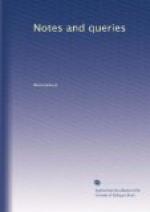3.
“But if you ring in spur or hat,
Sixpence you pay—be sure of
that:
And if a bell you overthrow,
Pray pay a groat before you go.”
(dated) 1756.
ALFRED GATTY.
Ecclesfield, April 6. 1850.
Note Books.—Looking at what your correspondent says about “Note Books,” I think the following hint may be useful to others, as it has been to myself. Many persons never get so far as the formality of a common-place book, and do not like to write in their books. Let them follow my plan. The envelope maker will procure them any number of little slips of white paper, with a touch of isinglass at each of the four corners. Let the note be written on one of these, and then let the slip be stuck into any book which is sure to be wanted in connection with the subject when it comes up again; either by one, two, or four corners, as convenient. The isinglass will not hurt the book, if ever it be wanted to remove the slip. A note is more in the way, when attached to a book which suggested it, than when buried among unindexed miscellanies; and there are few who index themselves. Your motto is good as far as it goes; but the other half is wanting:—
“When made a note of,—find if you can.”
M.
* * * * *
LADY RACHAEL RUSSELL.
Mr. Dyce has admitted Lady Rachael Russell among his British Poetesses on account of the following verses:—
TO THE MEMORY OF HER HUSBAND.
“Right noble twice, by virtue and
by birth,
Of Heaven lov’d, and honour’d
on the earth;
His country’s hope, his kindred’s
chief delight,
My husband dear, more than this world’s
light,
Death hath me reft. But I from death
will take
His memory, to whom this tomb I make.
John was his name (ah, was! wretch must
I say),
Lord Russell once, now my tear-thirsty
clay.”
Now “John” was not the Christian name of William Lord Russell, so that these verses could not have come from his widow’s pen. Indeed, they are much older than Lady Rachael’s time, and may be found on the monument in Westminster Abbey erected by Lady Russell, in the reign of Queen Elizabeth, to John Lord Russell, who died in 1584.
P. CUNNINGHAM.
* * * * *
Byron and Tacitus (No. 20. p. 390.).—To your young friend, who honestly signs himself “A SCHOOLBOY,” let an older correspondent say, that he will do more wisely to let the rules of his teachers keep him from perusing an author who makes a mock of all moral and all honourable feelings. But if he wishes to know whether the introduction of the sentence from Tacitus into a poetical tale should be called “cabbaging,” the reply will properly be, No. The poet expected that the well-known figure, which he had thus thrown into verse, would be immediately recognised by every literary reader,




